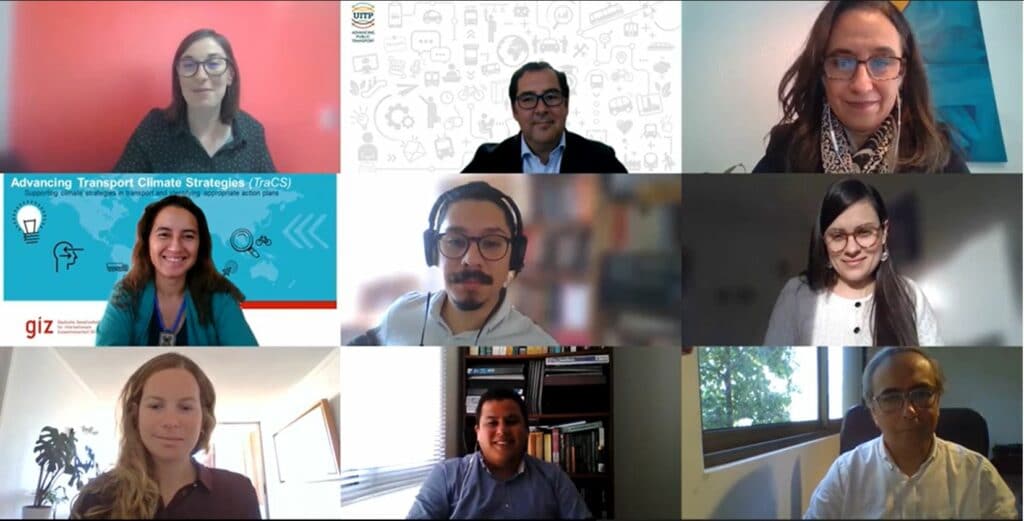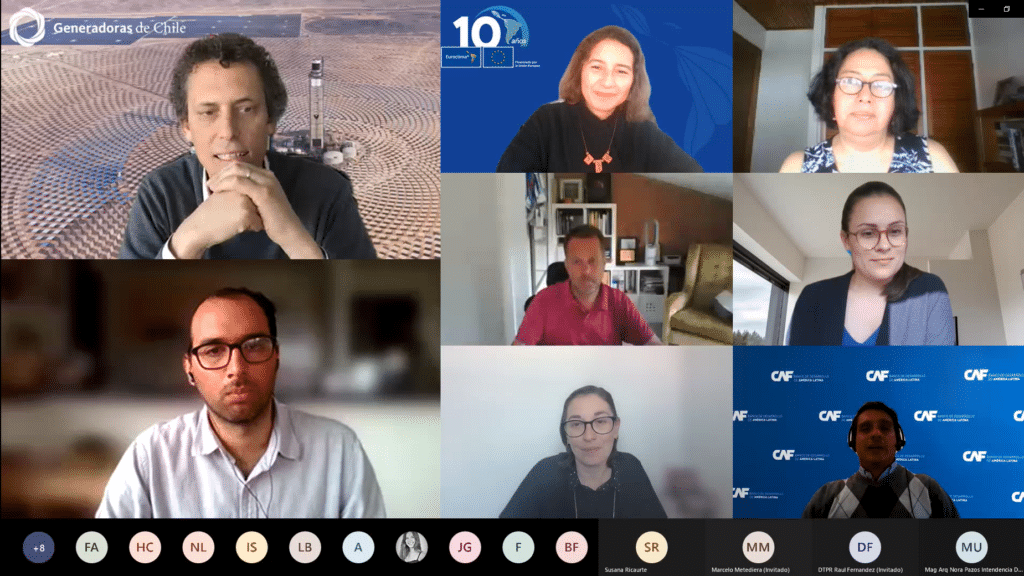
“It has been very enriching for us to learn about the experiences of other cities and countries that are already a long way ahead, such as Chile, Colombia, Mexico. And how they have resolved many of the unknowns that we have at the moment. This experience has helped us to understand”
Manuel Sánchez, Public Transport Board of Costa Rica
Between January 2021 and January 2022, a series of 6 technical exchanges for the transport sector brought together representatives of transport, energy and environment ministries from Argentina, Chile, Colombia, Costa Rica, Dominican Republic, Ecuador, Mexico, Paraguay and Uruguay.
The Ministry of Transport and Telecommunications, and the Ministry of Energy of Chile, hosted these exchanges as part of the Chilean Presidency of COP25. The objective was learning and exchanging experiences, tools and recommendations on different aspects of sustainable transport in Latin America. The series were organised with the support of GIZ through its Moving Chile project.
Six meetings, six themes

The six exchanges held this year focused their themes on strategic areas for the decarbonisation of transport, specially designed according to the reality of Latin America.
The exchange “Long-term strategies (LTS) for the transport sector in Latin America” inaugurated the series. It was presented in conjunction with the EUROCLIMA+ programme. Here, the experiences of Chile, Finland and the United Kingdom were presented. In addition, the three countries discussed the inclusion of the transport sector in the LTS, and the needs and gaps still necessary to tackle.
The second meeting focused on the Recovery of public transport in the post-COVID-19 context was organised jointly with the International Association of Public Transport (UITP). Dionisio González, from UITP provided a global and regional overview of the public transport situation and recommendations for its recovery from the crisis. In addition, Carolina Simonetti, Chief of Cabinet Advisors of Ministry of Transport and Telecommunications of Chile, shared the challenges and solutions addressed to maintain the operation despite the decrease in passenger demand and the coordination with operators during the pandemic. And Mr José Solís presented the experience of the Transit Authority of Lima-Callao (Peru), referred to the system of subsidies implemented during the most critical phases of quarantine and mobility restriction.
Sustainable Urban Mobility was the focus of the third technical exchange. This was organised jointly with the Mobility Component of the EUROCLIMA+ programme, with the participation of ECLAC. It focused on the role of cities and their transport network in reducing emissions . To this end, Jimy Ferrer from ECLAC gave an overview of the sector’s potential to reduce emissions. The cities of Madrid (Spain) and Guadalajara (Mexico) presented the strategies used to overcome the challenges and positive impacts revealed in the implementation of Sustainable Urban Mobility Plans (SUMP).

“Beyond metropolises. Strategies for the electrification of public transport in intermediate cities” was the title of the fourth meeting of the series. Its objective was to discuss the advance of electromobility and the challenges for its implementation in mid-size cities. Gonzalo Muñoz, COP25 High-Level Champion, was responsible for making a call to action on the responsibility of transport in climate action. In addition, the Regional Public Transport Directorate of Chile (DTPR) shared its experience in the development of operating systems consistent with the realities of intermediate cities and Colombia, who shared the challenges and opportunities identified in the implementation of its Commitment Electromobility in Colombia.
The exchange had a panel discussion composed of Claudio Seebach, Executive President of Chilean Generating Companies; Ana María Majano, Coordinator of ArticuLAC: Community of Practice on Public-Private Articulation for Climate Action of EUROCLIMA+, and Andrés Alcalá, Senior Executive Directorate of Infrastructure Analysis and Technical Evaluation, Development Bank of Latin America.
The fifth exchange continued along the lines of electromobility, but broadened its perspective to other urban transport modes. For this, Arturo Steinvorth from the Partnership on Sustainable, Low Carbon Transport (SLOCAT) gave an overview of the importance of decarbonising the various existing urban transport modes. In addition, the participants got to know the experiences of the Electrologistics pilot programme developed by the Ministry of Transport and Telecommunications of Chile; the Taxi Electrification programme implemented by the Municipality of Montevideo (Uruguay); and the Bicycle Electrification programme, developed by the Ministry of Productive Development of Argentina.
The decarbonisation of freight transport was the theme of the sixth exchange, where Leticia Pineda from the International Council on Clean Transportation (ICCT) was responsible for providing a regional overview of its impact on emissions.
The exchange also discussed the experiences from Giro Limpio, from the Energy Sustainability Agency of Chile; Transporte Limpio, from the Ministry of Environment and Natural Resources of Mexico and Transporte Inteligente, from the Ministry of Economics of Argentina.
“It helped us to know which path to take, what we have to consider and what other countries are considering, to see what is useful for us to solve our challenges”
Diego Marqués, Project Leader of the Planning Project of the Institute of Planning and Development of the Metropolitan Area of Guadalajara, Mexico.
Experiences to share
Through the exchanges, it was possible to learn essential lessons and experiences from the region that can be useful to other countries and help advance climate action in the transport sector. The publication “Increasing climate ambition in the transport sector: Good practices, lessons learned, and recommendations from Latin America” is available with the key messages and highlights of the valuable experiences. Chapters 14 is already available online, and chapters 5 and 6 will be available in February and March.
